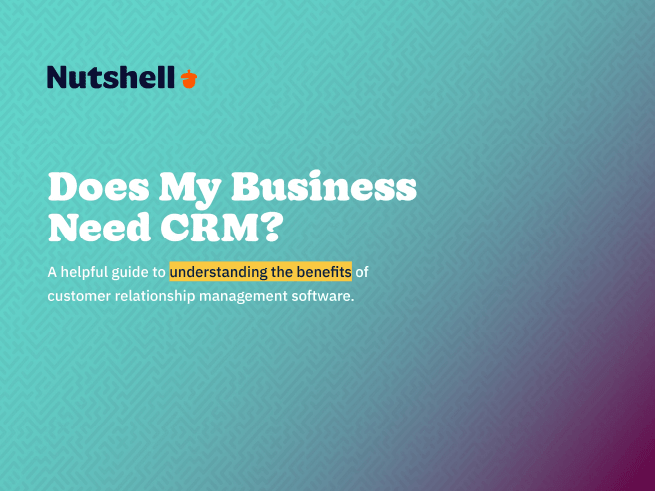
CRMs and ERPs both manage business data, but CRMs focus on customer relationships, sales, and marketing, while ERPs streamline internal operations like finance, inventory, and HR.
While they can overlap, using the right system depends on your business priorities—growth and customer engagement vs. operational efficiency and resource planning.
The takeaway? For B2B teams, a CRM drives pipeline and revenue, while an ERP supports the backend—successful companies often need both to scale smart.
If you’re struggling to streamline data and day-to-day business activities, customer relationship management (CRM) software and enterprise resource planning (ERP) platforms can help.
But what’s the difference between CRMs and ERP software? Do you need both?
In this blog post, we’ll compare CRM and ERP software and look at what each tool can do for you.
Keep reading to learn more!
Summarize this content with AI:
To begin our comparison of CRM vs. ERP, let’s first define what each type of tool is.
A CRM, or customer relationship management tool, is a platform that exists to help your business keep track of data related to your leads and customers. Whenever a customer engages with your business, they generate data. That data can include:
Tracking that data can help you learn about your audience, which is where CRMs come in. A CRM can integrate with other tools in your marketing stack to pull all your customer data into one place, so you can organize and use it to create personalized touchpoints that drive conversions.
An ERP, or enterprise resource platform, is another type of data management tool. Like CRMs, ERPs pull data from various other tools and centralize it in one location where you can organize it. The idea is to have all your data in one place so all your teams can access the same information and therefore be on the same page about things.
The difference between CRM and ERP tools is that where CRMs focus exclusively on customer data, ERPs deal with data from all across your business. That still includes customer data, but it also includes things like product inventory and utility costs. Basically, you can put any type of data your company wants to track into an ERP.
As you might expect, this means ERPs are much larger and more complicated than CRMs. For that reason, as the name suggests, they’re often optimized for larger businesses and enterprises rather than for small companies.
Now that we’ve defined what ERPs and CRMs are, let’s talk about the benefits of using each one.
The primary advantage of using CRMs is that they help you improve the user experience for your leads. Your main goal is always to drive more sales, and to do that, you need to make your leads happy. But you can’t do that unless you know who your leads are and what they want.
CRMs are the perfect tool for helping you do that. As you gather data about your customers, you can compile that information into help charts and reports, letting you see exactly who your customers tend to be and what they most often seem to want. You can then tailor your marketing to meet those needs.
The main benefit of an ERP is centralization. By moving all of your company data into a single platform, you can make your job—and the jobs of everyone at your company—far less complicated. You can prevent everyone from having to juggle 15 different tools just to get a comprehensive view of your data.
On top of that, ERPs can help you avoid data silos. Data silos are where different teams at your company fail to communicate, meaning they don’t share data that could be useful to one another. But with an ERP, each team funnels its data right into the platform, where every other team can view it as well.
That means that all your teams are in sync at all times, ensuring maximum efficiency.
So, we know what CRM and ERP platforms are, and we know how they can benefit you. Your question now is probably, “Do I need either of these tools?” Let’s look at the answer to that question for each tool.
If you’re wondering whether or not you need a CRM, the answer is an unequivocal yes—at least, if you have any interest in improving your marketing and earning more customers.
The simple truth is that to improve your marketing, you have to see how customers are responding to it. And the last thing you want is to have to jump between a million different tools to see all your disparate pieces of customer data.
You definitely want to have a CRM that can bring all that data together in one place and help you analyze it to learn more about your audience.

The question of whether or not you need an ERP is a bit more complicated. Especially if you’re a smaller business, there’s nothing stopping you from using a few different tools in place of a single ERP. That said, an ERP could still be helpful.
It’s also worth pointing out that ERPs are more necessary for large businesses that just have so much more data to keep track of. Smaller businesses can much more easily do without ERPs—you could use a CRM for your customer data, another tool for your finances, another for your product inventory, etc.
It really just depends on your company’s specific wants and needs. Keep in mind, though, that ERPs can get expensive—often tens of thousands of dollars to implement and thousands more each year for a subscription. So, if you want one, just make sure there’s room for it in your budget first.
Because ERPs can help you manage all kinds of data, including customer data, it’s possible to find an ERP that essentially has a CRM built into it. So, if you’re looking to buy both types of tools, you may want to consider getting a combined ERP and CRM. But should you?
There are definitely some reasons to get a two-in-one tool, the biggest of which is convenience. Getting an ERP with a CRM built in will mean you only have to manage one tool rather than two. Plus, it can sometimes be less expensive than buying two separate tools.
But there are drawbacks to this arrangement, too. In particular, the more features a tool has, the less specialized it tends to be. So, while some ERPs have CRM functionalities, you probably won’t find an ERP that has the same kind of CRM specialization as an actual CRM tool.
Advanced reports, detailed lead categorization, sales automation—these are things you can find in a good CRM tool, but that an ERP may not have.
Ultimately, it’s up to you. If you want a CRM that can perform advanced functions and really give you detailed insights about your customers, it’s better to go separate. But if you only want the most surface-level CRM features, you’re okay to get a combined tool.
Now that we’ve explored the distinction between CRMs and ERPs, you might feel ready to get a CRM for your own business. If so, you won’t find a better option than Nutshell. Nutshell is a CRM designed specifically for small- to medium-sized businesses like yours, and it comes with no shortage of features, including sales automation and customized reports.
Not only that, but Nutshell has the best CRM customer service team you’ll find. If you ever have any questions or issues with Nutshell, all you have to do is give us a call, and we’ll help you figure everything out promptly. We won’t leave you on hold or recite lines from a customer service script, we’ll offer genuine assistance.
Interested in trying out Nutshell today? Get started with our 14-day free trial!
Start with a CRM if customer growth is your priority—it delivers faster ROI and is easier to implement. Choose an ERP first if operational chaos (inventory, finances, supply chain) is holding you back. Most small businesses benefit from implementing a CRM like Nutshell first, then adding ERP as they scale.
CRM implementation typically takes 3-6 months and delivers quick wins in sales efficiency and customer management. ERP implementation takes 6-18 months due to complexity, customization needs, and cross-department integration. CRMs like Nutshell offer faster time-to-value, making them ideal for businesses needing immediate improvements.
Traditional ERP systems cost
$50,000−$500,000+ annually, making them prohibitive for most small businesses. However, affordable cloud-based alternatives exist starting at
$150−$250 per user monthly. Many small businesses find a robust CRM like Nutshell ($13−$79/user/month) handles their needs without ERP-level investment until they reach enterprise scale.
CRM-ERP integration typically uses APIs, middleware platforms (iPaaS), or pre-built connectors to sync data automatically. Customer information from your CRM flows to ERP for order processing and invoicing, while inventory and financial data flows back to inform sales teams. This creates a unified view of customer interactions and business operations.
Salesforce is a CRM platform, not an ERP system. It focuses on customer-facing activities like sales, marketing, and service—not back-office operations like inventory, manufacturing, or financial accounting. While Salesforce can run cloud-based ERP apps on its platform, its core strength is customer relationship management, similar to Nutshell’s specialized CRM focus.

Join 30,000+ other sales and marketing professionals. Subscribe to our Sell to Win newsletter!